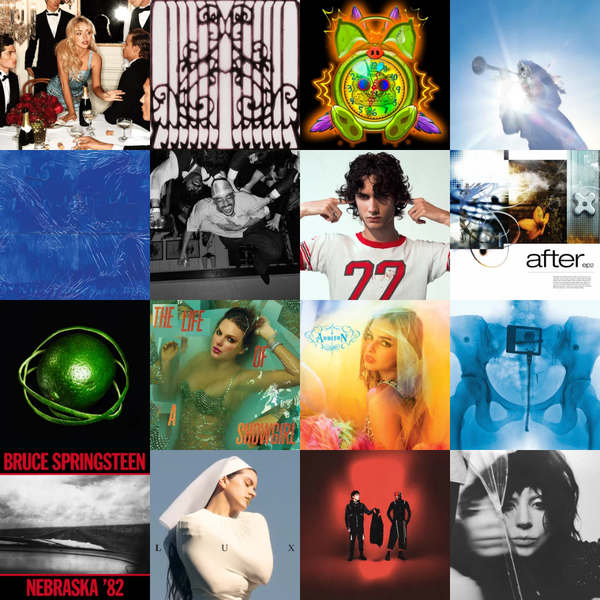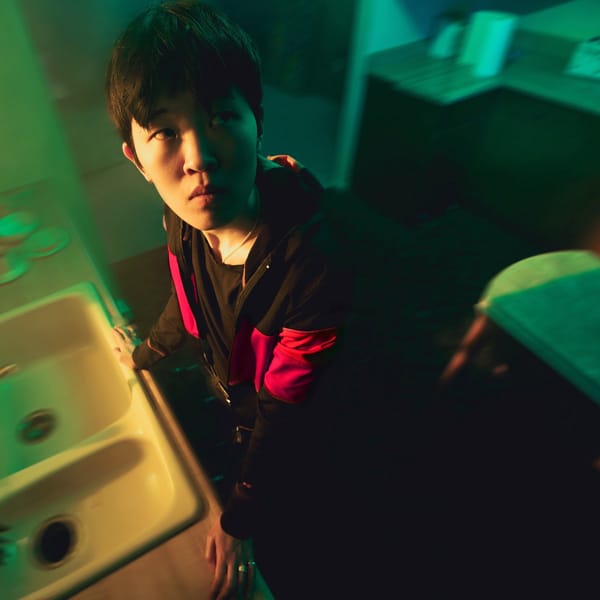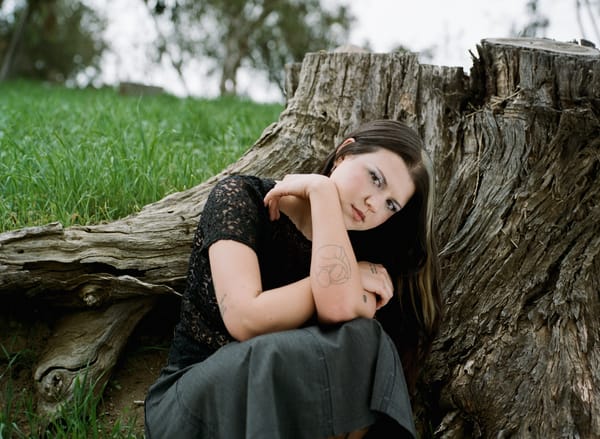Beauty in the Breakdown: Partygirl - Birdspotting
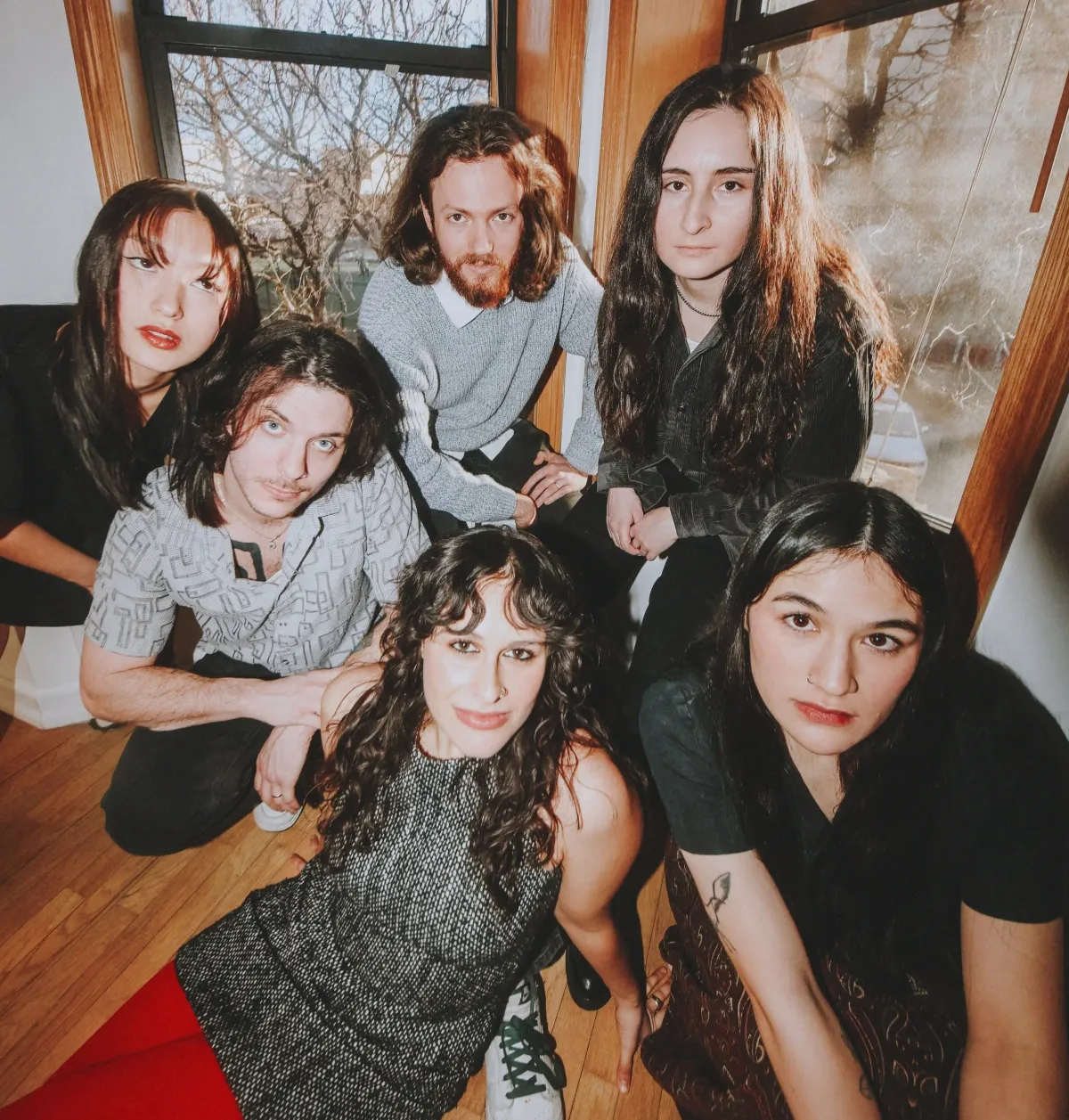
Partygirl is a NYC-based band known for their maximalist arrangements and the singular androgynous alto of Pagona Kytzidis. They’re one of the most inventive, chaotic bands in the entire New York indie scene, garnering a cult following for their relentless live shows and unpredictable song structures. The band’s rounded out by producer/mixer/guitarist Francesca Pastore, drummer Jonathan Ashley, violinist Claire Lin Jenkins, bassist Andrew Jordan, and saxophonist Jenna Love.
They release their debut full-length, I’m So Charming I Forgot Who I Was, on September 26. Here, we’re breaking down the lead single from I’m So Charming (II), “Birdspotting”. Even for a band known for intensity, it’s their most ambitious song to date, kicking off with an unusually funky guitar riff before a musical theater-esque pre-chorus and a raucous outro. On the paid tier, you can find out more about their song “Tony Soprano”.
Fran, how did you get into music production?
Out of necessity. Poor college kids can't afford to go to the studio and somebody had to take some initiative. I was in a band with boys, so I was like, fine, I'll learn Logic Pro. It can't be that hard, right? It turns out it was a little hard at the beginning. And then I remember some dude on my floor in college said “just because you have Logic doesn't mean you're going to be a good mixer now that you've upgraded from GarageBand”. And I was like, bro, alright.
So I just watched a lot of YouTube videos and I was really bad for a good year and a half. I had this mentor who does a lot of work on scoring films and stuff back in Virginia when I was home. We would hang out, be in his home studio and he was like, you want to just mix for fun? I would just watch him and all his gear and how he would work. I had a different song for my personal music that I was making at the time, and I was like, “I need help because I can't get this to work the way that I wanted it to”. And then he showed me all the different recording techniques of how to record a guitar, from there we talked about arrangement and how that influences the mixing. And then from there we would just mix for fun and then I finally got better at it.
I also just wanted to prove a point that women can do it too. Honestly, it was out of spite. And then I think in 2021, I was like, wait, I'm actually good at this now. I then interned at Studio G for a year [where Partygirl later recorded]. It was mostly because I wanted to learn the analog stuff. I did everything in the box in my bedroom and it was really cool to actually learn how everybody set up mics and also just learning studio etiquette and seeing how other musicians come in and record. It took away the “Oh my God, we're going to the studio” intimidation.
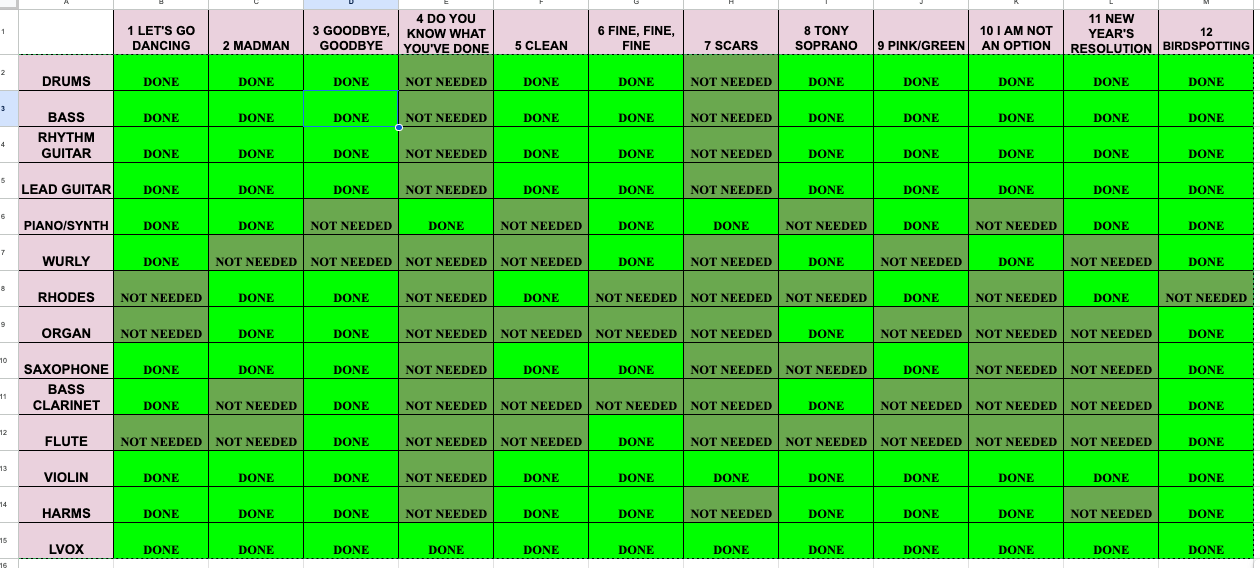
Let’s start with that ending.
Pagona:
This whole record is about crisis and coming to terms with yourself and also your gender and sexual violence and the impact of how that has on growing up as a person, specifically to me. I know I needed an ending.
Fran:
You wanted cacophony.
Pagona:
I'm no longer confused [by what happened at the end of the record, everything is crystal clear to me and there's so much energy and chaos and rage, and I felt so angry all the time. I wanted to cause a scene. I think that I had so many questions that I wanted to ask all these people that I could never ask them, because you never want to make a scene. Something I was taught for better or for worse is as soon as you let people know, if you get mad at people, then you tell them that you care about them, and you're not supposed to do that. For the ending of the song, I wrote the first half first and I didn't know where I wanted to go. I had this very particular conversation with this guy I'd been seeing for such a long time, and we didn’t have the best dynamic. And he was just telling me about how he was reading Freud and he was telling me about Freud's commentary on Marx. I'm sorry, this is so heady, but -
I know your band, I’m used to it.
Pagona:
He said that somehow this concept of dreams and commodities are one and the same for either Freud or Marx, then he left, and that was the last time I ever saw him after 10 months of seeing him. That contradiction between being a dream and being a commodity summed up how I was being treated by a lot of people who were obsessed but also disgusted. And so that's where the ending of all these questions come at the end of the song, which you can never hear live because it's so loud. These are questions that I've never received answers to and I don't know if I ever will, but that's how that came about. And I just knew I wanted it to have this feeling of I am standing there very seriously and very earnestly asking these questions, and there's just this spinning going around how I felt all the time.
Fran:
There is an answer to “what’s the shelf life of a pretty little thing?”, though!
Pagona:
Yeah, 25.
“BIRDSPOTTING”
Fran:
For this song, I went back to mixing 101 and was like “I have to figure out how to make this work”. But also, it doesn’t need to work perfectly, I just need to make sure people can hear Pagona sing and what words she’s saying.
Can you talk about putting this one together?
Pagona:
The song came in bits and pieces. It started at the end of 2020 and I was moving back to New York to finish college and I had to go get a COVID test on the main road through shopping centers in the town where I grew up. And I am sitting outside of this testing center and the sun is setting over the trees and the shopping mall, and I was just like, this is gorgeous. I was like, this is America, man. And it just really stuck with me, this imagery. When I went back to school, that was in my mind. And then I got really into birds. I got really into birds during lockdown.
I went birdwatching in Central Park. There was this owl that was there, we would go look for the owl and we would just have these long discussions. We were also in this college class about American government buildings, political infrastructure or something. I just remember they wrote this brilliant paper on rural public space and shopping malls as the new meeting houses for rural New England. And that struck me as very brilliant and very true and all of this surrounding also the breakdown of what I feel like was the reality of my life. All those lines I wish you had told me. It's like that honest and the dreams being crushed of what life actually is and how you expect to be treated by other people versus the reality of everything growing up and violence and coming to terms with your world. I think that Birdspotting, even though it's inspired by events that were in the moment, was written after the moment. So I have the benefit of hindsight.
I can get so caught up in the performance that I forget what's actually going on with
me, and who I am and my position in a room. And you can fall into situations like that. And I think that was the sum of the record and how it all came to pass. But musically, I wrote those chords at my parents’ place, where I wrote a lot of the music. Fran came up with the cheeky little riff and Claire with the intersecting riff, it was one of the first things she ever played with us [when she joined the band]. And that’s how it came together.
BASS
We didn’t do any bass amp recording because they had a great preamp at Studio G. And then I also took the sound and I put this Brainworx Ampeg for extra high end. I put the Waves C6 on both of them, basically just taming the boominess, then I took out nodes on the Pro Q. Yeah. And then I love Pro Q, so I just took out nodes. And then I blended the bass amp with the DI. I did that on the majority of the album minus pink green, because there was more room for the bass to breathe because there was less instrumentation. It was more sparse and a lot of reverb..
Guitar:
All the riffs I play on the album are in the background. I have the main guitar progression that's fuzzed out or whatever, but also in the back, I have riffs from the entire album.
Drums:
It’s OTT and Decapitator right directly on the bus, and then automated a little bit directly on a parallel bus. So then I think I blended it in maybe, I think it only needed 30%. I put the Decapitator on the “Punish” setting, which pushes it extra loud.
I have a regular drum bus, and then I have my main drum bus where all of the kit pieces are going to the drums, and then this drum bus is going to the bigger drum bus because it's mixing both the parallel and the regular. I don't know why I did that, but that was crazy.
I don't have any samples on any of the drums [a common practice in music production]. It's all just what was recorded. I was very proud of that. Gated pretty normal. I take out all the high end and the kickout. I think it was just boom, me at 200, I added some gain because I didn't realize that you could add gain here. When I was mixing.
Vocals:
I used the Brainworx SSL emulation for everything I'm EQing minus the drums. I like the SSL as my main EQ for adding things. And then I also touch it a little bit with compression because Pagona is a very dynamic vocalist. I am doing a lot of taming for her transients on the compression, fast attack and everything, but it's working lightly, just to smooth it out. I put the Pro-DS [which reduces sibilance] and the 1176 [a famous compressor] emulation.
The vocal track itself is just Little AlterBoy and MicroShift for doubling, and getting rid of all the low end all those things built up. I also have a quarter-note delay on it. I also used the EchoBoy, but didn’t put any saturation on it. We also had gang vocals and I smashed those [with a compressor], they were off because we couldn't hear all of us shouting “what's the shelf life of a pretty little thing.” It almost feels like a weird slap delay in the background, but it’s the whole band minus Pagona screaming into a Neumann U87.
—
“Tony Soprano”
Talk about Tony Soprano’s concepts
Pagona:
The way my process works, sometimes ideas take years to develop and percolate, and I'll just keep running a collection of ideas or things. And the beginning of Tony as the story of the song began when I was a sophomore in college and really imploding for one of the first times in my life properly. And I was going to therapy for the first time also, and the campus was on fire. It was the time of the Brett Kavanaugh hearings, and so everyone was losing it because of the obvious totality and just regularness of such an event in the lives of the students there, unsurprisingly
This all came to a head when I was in therapy at Barnard College for the first time, and they ran out of therapists. So I was seeing a student, student therapist, not a student at the college, but a therapist in training.
My therapist basically just said to me that I was like a shark because I just wouldn't stop going. I would just keep taking stuff on. I keep moving through it instead of sitting with anything. And I laughed because I said this is the same metaphor that the therapist uses to describe Tony. She didn't know that. And I was like, “you probably shouldn't use this metaphor for other people”.
So that was the origin of this idea, but I didn't write the song until much later and develop the lyrics in the story until much later when I was peak going through it as a young 23-year-old woman running away from a lot of things. It's a song about power and sexuality and gender and trying to explore yourself through others and how others see you and how much risk and game and adventure, but also danger. You put yourself in when you're in that mindset. And I was doing this constantly, and I was really rejecting a sort of feminine positionality towards this experience. I wanted to be active and I wanted to be the subject, and I wanted to be the one making decisions. And I think that a lot of people were fascinated and disgusted by this, and a lot of men were fascinated and disgusted by this and by me.
This created all these misadventures that led to the song. And I did it a lot with my friends, and that's where the ending of the song comes through, as this group freedom that we felt at the end and what we had with each other. But we came to practice one day and I came with all the lyrics and I was like, Fran, you want to write something to this?
Fran:
You're like, I want a nasty riff, give me a nasty riff!. So I came up with the riff and then we built the rest of it. And then Jonathan Ashley was like, “what if we made the pre-chorus in 15?” And we said, “why not”?
I’ve always heard a little bit of camp in this song with lines like “all these men, not one is worthy.”
Pagona:
I think it's funny in retrospect how campy it is. When we were doing the music video, the assistant director was always like, it's time for me. The assistant director kept being like, “you guys have to go put on your drag now.”
What I like about this one is that there are definitely verses and choruses, but I wouldn’t call this a typical pop song structure by any means. Can you talk about developing the structure?
Pagona:
We’ve been joking that, the first half of the Party Girl song and then comes the second part of the song and we should stop doing that. But on this song, you have this first half, which is over the top, and campy, then you have the second half where all of that is broken down, and now you're really looking at what's inside and what's actually going on. The ending, the audience is different, the audience shifts.. If this is a song inspired by these experiences, it's one thing, but the first half is you're out for the night, and the second half is you've gotten home this morning and you're talking about it with your friends.
In the mix, there’s a moment when Jonathan Ashley’s drums slowly fade in.
Fran: Jonathan just did the fade in live by himself, and we were like, we're going to keep that because he's super musical in terms of how he places drums too. So I think it was less of a, I mean when I was recording it or when we were recording it obviously had to do the manual fade in, but he almost did it himself too, so it wasn't that hard. The way he played it though. It sounds like there's reverb on the drums, but there isn't any, and I don't know how that happened. It sounds like you're in a bigger room than what it actually was. Jonathan doesn’t like having the tiniest bit of gate on his snare or even that much of [the sound of the room]. Because it started so quiet and we were going up, you could hear the bus on it, so I just turned it off and then once everybody was in, I put in a little bit, I snuck it in. I'm sure he'll be upset about that, but it's fine.
